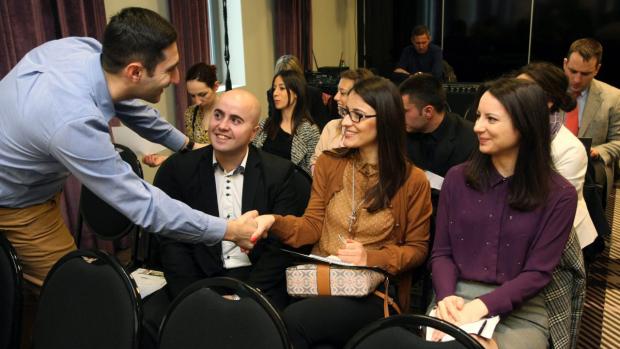Serbia's Alumni Network for a safe and secure future
Fifteen years ago it was hard to imagine that young men and women could have an impact on security issues in Serbia. Security was a sensitive, almost isolated domain firmly reserved for the State. However, Serbia’s transitioning towards democracy has fostered a security sector that is more service-oriented and focused on the respect of human rights.
The OSCE Mission to Serbia has been one of the main partners of the Serbian Government in providing assistance during the reform process, aiming among other things to make the security sector more transparent and inclusive. A bad economic climate, austerity measures, corruption, and terrorism are just some of the security risks facing Serbia in the forthcoming period.
A project on consolidating democratisation process in the security sector in Serbia, implemented by the Mission in co-operation with the Swedish International Development Agency (SIDA) aims specifically to further enhance the principles of good governance in security section institutions, with special focus on involving youth. With that in focus the Mission granted in 50 scholarships for M.A. and Ph.D. students at Belgrade University’s faculties of Political Sciences and Security Studies, in 2015.
Scholarship recipients designed the Academic Alumni Network to support student learning through peer-to-peer communication, and exchange ideas and news on security issues.
Serbia's Alumni Network
The Network includes 50 recipients of MA and PhD scholarships from the Faculties of Political Sciences and Security Studies of the University of Belgrade who received funding by the Swedish International Development Agency as part of a project run by the OSCE Mission to Serbia on consolidating the democratization process in the security sector.
Youth and security
Young people, as future leaders and participants in public life, stand out among a range of security sector actors directly involved in post-conflict recovery. From early on the OSCE Mission to Serbia tried to address how reform can contribute to making security more relevant to the concerns of young people.
One of the scholarship recipients, Luka Glusac, is currently an advisor for Serbia’s Ombudsman, responsible for security issues. “The academic knowledge that was provided by the OSCE scholarship enabled me to apply a unique mixture of theoretical and practical insights in preparing briefings, speaking notes and reports on the Ombudsman’s activities,” said Glusac. “The education I received gave me an excellent foundation and comparative advantage to deal with human rights and security issues.”
Adel Abusara, a project assistant at the OSCE Mission to Serbia, says that young people with energy and ideas can serve as facilitators for the security reform process in their respective institutions, such as government security agencies, academic institutions, and NGOs. “In their everyday work they apply what they have learned,” said Abusara.
What the future holds
“Providing students with opportunities to put their knowledge into practice and gain hands-on experience is vital in this process,” says Marko Kovacevic, Chief Administrator of the Alumni Network and a former recipient of an OSCE scholarship. He hopes that the exchange of good practices and opinions can become an accepted practice in future. Alumni can contribute to reform whether by making draft law propositions, or by simply raising awareness regarding security issues.
In order to establish the practice where young people can have a say when dealing with issues like security, security governance, and security reform - issues which affect not only themselves, but society as a whole – students should co-operate with one another, and the creation of the Alumni Network is a step towards achieving that goal.


